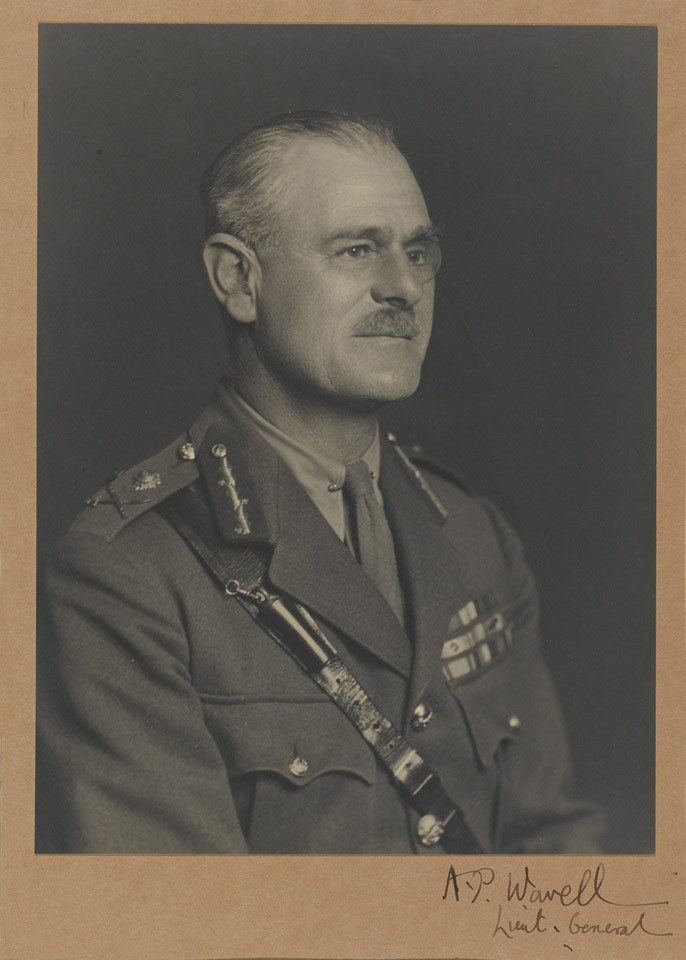
Online Collection
Lieutenant-General Sir Archibald Wavell, 1938
Photograph, 1938.
Wavell (1883-1950) was born the son of a major-general in 1883. Graduating from Sandhurst in 1901, he joined the Black Watch, and fought in the Boer War (1899-1902) and India. He attended Staff College, spending a year in Russia as a military observer, returning in 1912 to serve as Staff Officer Grade 3 at the War Office.
World War One saw Wavell as General Staff Officer Grade 2 at GHQ. He soon took up a field command as Brigade Major of the 9th Infantry Brigade. He lost an eye in the Second Battle of Ypres (1915) and earned a Military Cross before returning to the General Staff where he held several posts including Russian liaison in the Caucasus and Assistant Adjutant and Quartermaster General to the Supreme War Council at Versailles.
Between the wars Wavell continued to hold important staff postings, such as Assistant Adjutant General at the War Office, and aide-de-camp to King George VI. His experience in the Middle East saw him appointed as GOC Middle East Command in 1939.
Italy entered the war in June 1940, greatly outnumbering British forces in North and East Africa, forcing Wavell to fight a flexible containment. His forces withdrew into Egypt, before luring the Italians into over-extending and counter-attacking them in Libya in 1940, and then Eritrea and Ethiopia in 1941. By February 1941, Wavell overran the Italian Tenth Army, capturing 130,000 prisoners, and nearly driving all Axis forces from North Africa.
However, in April 1941 the Axis launched a Balkans offensive that threatened Greece. Wavell was ordered to halt advancing, to free men for Greece and Crete. Wavell's weakened Western Desert Force was unable to hold back Rommel's Afrika Korps who were reinforcing the Italians. Wavell again withdrew to Egypt, leaving Tobruk besieged for 240 days. He was given the opportunity to relieve Tobruk, but Rommell's brilliant defensive tactics saw the operation end in failure. Winston Churchill replaced Wavell with Claude Auchinleck, who praised his predecessor for his work.
Wavell became Commander-in-Chief in India, responsible for the defence of India, Burma, Malaya, the Dutch East Indies and the Philippines, and again finding himself vastly outnumbered, he was unable to prevent Malaya and Singapore falling into Japanese hands.
In January 1943 he became field marshal and in September was appointed Governor General and Viceroy in India, effectively ending his military command duties. Wavell struggled to deal with the rival political factions during Indian independence, losing the confidence of Prime Minister Clement Atlee, who soon replaced him with Mountbatten. Returning to England, he was created Earl Wavell, passing away in 1950.
Wavell became Commander-in-Chief in India, responsible for the defence of India, Burma, Malaya, the Dutch East Indies and the Philippines, and again finding himself vastly outnumbered, he was unable to prevent Malaya and Singapore falling into Japanese hands.
In January 1943 he became field marshal and in September was appointed Governor General and Viceroy in India, effectively ending his military command duties. Wavell struggled to deal with the rival political factions during Indian independence, losing the confidence of Prime Minister Clement Atlee, who soon replaced him with Mountbatten. Returning to England, he was created Earl Wavell, passing away in 1950.
NAM Accession Number
NAM. 1984-01-80-13
Copyright/Ownership
National Army Museum, Out of Copyright
Location
National Army Museum, Study collection
Object URL
https://collection.nam.ac.uk/detail.php?acc=1984-01-80-13

